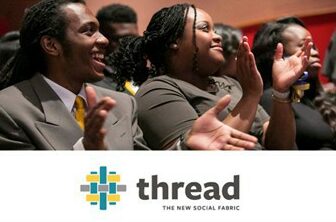



Doctors, nurses, students and staff drive back and forth along Orleans Street day in and day out en route to the Johns Hopkins medical campus. The view outside their cars can appear bleak, so drivers frequently avert their gaze and focus on the destination ahead. But one day Sarah Hemminger decided to stop the car and look around.
A graduate student at the School of Medicine, Sarah walked into Paul Laurence Dunbar High School on the corner of Orleans and Caroline in search of two things: students who needed support and a way to resolve the knot of loneliness she was feeling in her own life. Since that day in 2004, Thread (formerly known as the Incentive Mentoring Program) has changed the lives of hundreds of students and volunteers in Baltimore City. Today, Thread facilitates mutually beneficial relationships among 207 students, 800 volunteers, and over 100 community collaborators. It has forged a new model of what a student support organization can be and is attracting national recognition (and national funding) for its bold vision and eye-popping outcomes.
Sarah admits that Thread’s goal is audacious: “We seek to end the cycle of poverty and replace it with a new, widely held vision [of community].” But, she insists, their strategy is “viable because it addresses the root cause of financial poverty: the problem of isolation.” Sarah explains that individuals in poverty are isolated not only from economic opportunity, but, more damagingly, they are isolated from even knowing about economic opportunity. And when they do know about economic opportunities, they are isolated from the resources that enable them to take advantage of them. They are not connected with people who have access to adequate economic, social, and emotional resources.
Thread’s first response, then, was to identify the most underperforming students at Dunbar (those at the very bottom of their ninth grade class) and surround each with an extended “family” of up to eight volunteers who would provide those resources. Sarah recruited other graduate students from Johns Hopkins and other young adults to serve as these volunteer “families.” The volunteers worked together to ensure that their student’s most basic needs – food, clothing, shelter – were met. They also worked together to provide their student with supports like daily rides to school, tutoring and homework help, cheerleading at sporting events, and check-in phone calls.
As the program grew in size and scale, Sarah and her team adapted the model. Each student still has a volunteer “family” that is led by a “Head of Family”, but now those “families” are grouped with up to ten other “families” into a larger “Thread.” Resource Teams support the students and volunteers in each Thread by offering academic, college preparation, legal, health, and other expertise and connecting them with community collaborators who provide pro bono services and networking opportunities to reinforce the efforts in each “family” and “Thread.”
These efforts have led to remarkable outcomes. Drawing deliberately from among the most challenged and disadvantaged youth in Baltimore City, Thread has retained 100% of the students it has engaged since the program’s founding ten years ago, with 100% of its students graduating from high school, 96% of them accepted into college, and 80% receiving a four or two-year college degree or certification.
To what does Sarah credit this success? The model works, she explains, because “we adopt them. We become their extended family and they ours. We persist and pursue. And if they reject us, we pursue harder. Trust is built in the pursuing.”
We’ve come to realize, Sarah continues, that the model is just as powerful for volunteers as it is with the students who they are supporting. That realization led Thread to rethink its initial understanding of poverty and isolation. “Isolation”, Sarah explains, “is a problem that affects those in financial poverty and those in financial affluence. Disconnectedness pervades both worlds; it is something everyone experiences. Poverty is being alone. Seeing poverty as a problem of isolation makes the problem about ‘us’ and not about ‘them.’ It allows – and requires—us all to make connections.”
The Abell Foundation salutes Sarah Hemminger and Thread for their work in supporting young people in Baltimore City and, more broadly, for “stitching a new social fabric” that will connect us all.